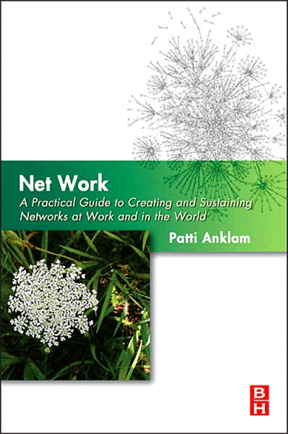SoMe and KM lessons learned — more from E2.0
As I mentioned in my last post, previous Enterprise 2.0 conferences had a big focus on “adoption” — how to get companies and the people inside them to use new tools to get their work done. As I sat through sessions in 2010, I heard the lessons of knowledge management being learned anew. That is, I felt I could trace a direct line from these lessons to many of the bullet points I myself had used on slides during the years 1997 - 2005 as I worked inside organizations and as a consultant to knowledge management initiatives:
- Focus on a business problem
- Have senior management support
- It’s 10% technology, 90% people
- KM must be integrated into your business processes; it is not something “extra”
- Look for key partners in HR, IT, and Operations
- Capture and distribute success stories
- Address “what’s in it for me”
- “ROI” is very, very hard to measure and may not be worth the trouble
- Culture trumps everything (that’s a direct quote from Tom Davenport)
And yet, speaker after speaker at E2.0 talked about these lessons without reference to the accumulation of learning within the knowledge management community (from which I believe many of these same folks came). I suspect that part of this lack of acknowledgment comes from not wanting to be tarred with the KM feathers. (Many people still don’t get it that “KM” isn’t one big monolithic system; that it is a collection of methods, practices, and tools that all support various aspects of identifying, creating, transferring, and augmenting both the hard and soft, explicit, tacit, and in-the-flow information, knowledge, and understanding that people need to know to get their jobs done. Think of these tools, methods, and practices as “apps” and good knowledge managers as people who are integrating these apps onto a platform. That’s the 2.0 way to think of it.)
Ok, so I got that off my chest. What was interesting to hear this year, 2011, at Enterprise 2.0 in Boston was that as the themes shift from technology to business transformation, the “K” and “KM” words are creeping in. (Yeah!).
- Sarah Roberts (@robertsgolden): “You can make information flow down in the organization, but can you make knowledge flow up?” “Individuals, left to their own devices, are pretty resourceful and knowledge-sharing prone.”
- Tom F. Kelly (@Moxiesoft): “The three key elements of success in social media: simplicity of design, knowledge as a center point, leadership” “Collaboration is about sharing knowledge, not data.”
- Mike Rhodin, IBM Social network in an enterprise is an everlasting knowledge repository.”
- Ross Mayfield (@ross): “Social software needs to create the knowledge trail as a byproduct of getting the work done, not as a discrete silo of “perfect” information.”
- Daniel DeBow (@Rypple) “For HR, it’s ‘who has the knowledge’ in the organization and collaborative tools can provide the answer.”
One of the “KM fellow travelers,” http://www.elsua.net/(@elsua), an IBM evangelist was also tracking a lot of the KM themes throughout the conference. Mining the tweet streams (I shower blessings on the capture of these by @jimworth), I found an number of Luis’ nuggets of recognition of KM themes:
- @elsua @joshscribner: finding experts, finding information, sharing knowledge. #IBM #BlueIQ ‘s 3 core values for socbiz. #e2conf” / Yes, sir!
- @elsua: #e2conf knowledge transfer remains one of the biggest issues for any collaboration strategy, regardless the generations #e2conf
- @elsua: #e2conf Ohhh, another flashback from KM in the late 90s: technology, process, culture (=people); was missing it, too!
 #E2conf
#E2conf
Most astounding to me was that Andrew McAfee, who coined the term eponymous term “Enterprise 2.0” gave a big shout out to one of knowledge management’s clarion calls from 1998, a quote from Lew Platt of HP: “If only HP knew what HP knows, we would be three times as profitable.” (And, If Only We Knew What We Know was the title of APQC‘s O’Dell and Grayson book that was one of the first KM books.) Then as if in answer to my unspoken question (“How does E2.0 take KM to the next level?”) he says, “Enterprise 2.0. Succeeded because it solves knowledge problem and gives everyone in the organization voice in a community.” McAfee’s talk addressed, in a way, the tacit/explicit model in KM. In the first part of his he cautioned against letting “old fashioned management” get in the way of using social technologies that promote tacit exchange and knowledge generation. The second part, on “new-fangled computers” , he focused on IBM’s Watson and its Jeopardy championship. His conclusion: the explicit part of knowledge capture, storing and recovery has been solved. Let’s now focus on “looking for questions that computers are not good at answering.”
I am thinking that this new territory, that computers are not good at answering, and which even in its fledgling days (Marcia Connor said of E2.0, “We’re in the first minute of social business. The next 5 years will tell so much more.”) is pushing beyond what knowledge management was able to address: relationships. I’ve said before, in the 3rd (current) era of knowledge management, “knowledge is in the network.” Social tools, within, beyond, outside, and organizationally orthogonal to the enterprise are going to give us unbelievably new kinds of knowledge about who we are, how we interact, and the creative results of those interactions. These are the lessons that we haven’t learned from KM. Now that we have tools for creating, evolving, mapping, and -especially — analyzing the impact of relationships we are going to learn a whole lot more.




